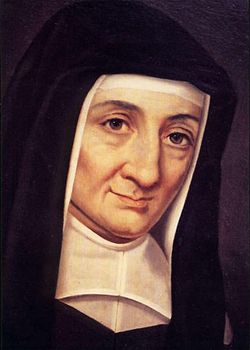Saint Louise de Marillac
| Saint Louise de Marillac, D.C. | |
|---|---|

Portrait of Saint Louise de Marillac, foundress of the Daughters of Charity
|
|
| Wife, Mother, Widow, Foundress, Social Service worker | |
| Born | August 12, 1591 Le Meux, Oise, France |
| Died | March 15, 1660 (aged 68) Paris, France |
| Venerated in | Roman Catholic Church |
| Beatified | May 9, 1920, Vatican by Pope Benedict XV |
| Canonized | March 11, 1934, Vatican by Pope Pius XI |
| Major shrine |
Chapel of Our Lady of the Miraculous Medal, Rue du Bac, Paris, France |
| Feast | May 9 |
| Attributes | widows' clothing |
| Patronage | disappointing children, loss of parents, people rejected by religious orders, sick people, social workers, Vincentian Service Corps, widows |
Saint Louise de Marillac, D.C., also Louise Le Gras (August 12, 1591 – March 15, 1660) was the co-founder, with Saint Vincent de Paul, of the Daughters of Charity. She is venerated as a saint by the Roman Catholic Church.
She was born out of wedlock on August 12, 1591 near Le Meux, now in the department of Oise, in Picardy. She never knew her mother. Louis de Marillac, Lord of Ferrires (1556-1604), claimed her as his natural daughter yet not his legal heir. Louis was a member of the prominent de Marillac family and was a widower at the time of Louise’s birth. Her uncle, Michel de Marillac, was a major figure in the court of Queen Marie de' Medici and, though Louise was not a member of the Queen’s court, she lived and worked among the French aristocracy. Thus Louise grew up amid the affluent society of Paris, but without a stable home life. When her father married his new wife, Antoinette Le Camus, she refused to accept Louise as part of their family. Nevertheless, Louise was cared for and received an excellent education at the royal monastery of Poissy near Paris, where her aunt was a Dominican nun.
Louise was schooled among the country’s elite and was introduced to the arts and humanities as well as to a deep spiritual life. She remained at Poissy until her father's death, when she was twelve years old. Louise then stayed with a good, devout spinster, and from her, she learned household management skills as well as the secrets of herbal medicine. Around the age of fifteen, Louise felt drawn to the cloistered life. She later made application to the Capuchin nuns in Paris but was refused admission. It is not clear if her refusal was for her continual poor health or other reasons, but her spiritual director's prophetic response to her application was that God had "other plans" for her.
...
Wikipedia
